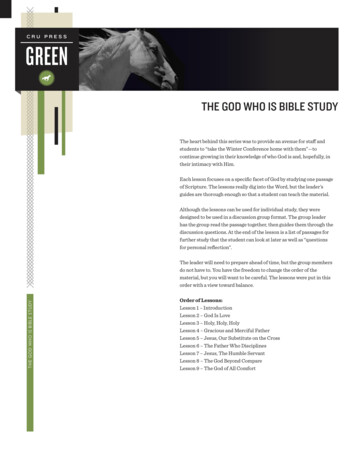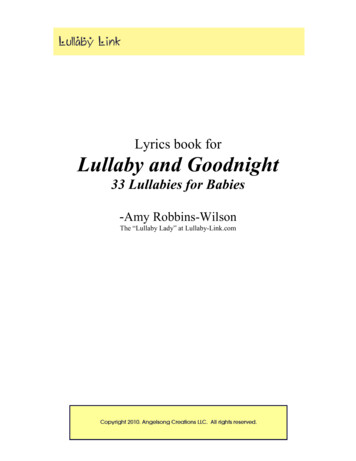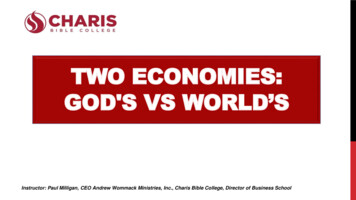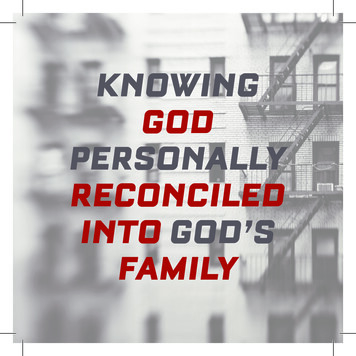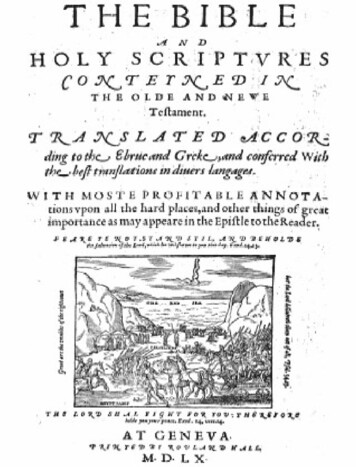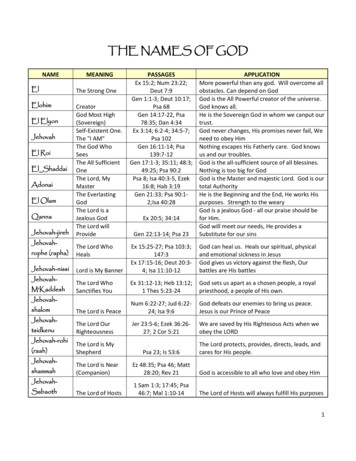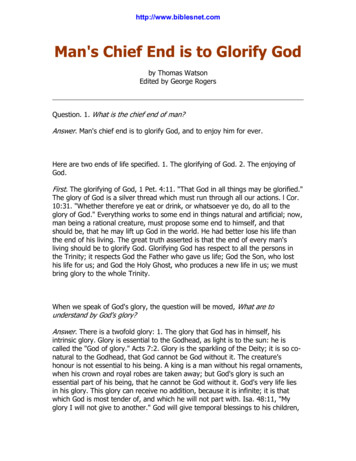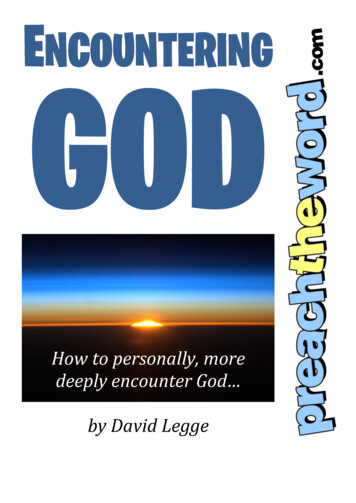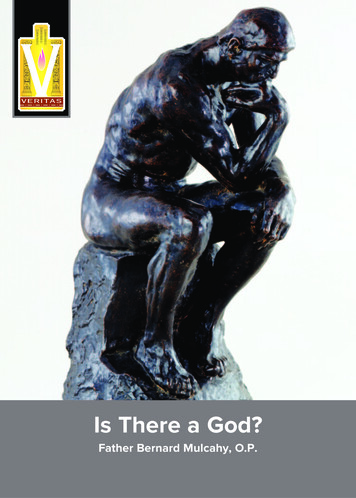
Transcription
VVERITASIs There a God?Father Bernard Mulcahy, O.P.
The Veritas Series is dedicated to Blessed Michael McGivney(1852-1890), priest of Jesus Christ and founder of theKnights of Columbus.
The Knights of Columbus presentsThe Veritas Series“Proclaiming the Faith in the Third Millennium”Is There a God?byFATHER BERNARD MULCAHY, O.P.General EditorFather John A. Farren, O.P.Catholic Information ServiceKnights of Columbus Supreme Council
Nihil obstatReverend John J. Connelly, S.T.D.ImprimaturBernard Cardinal LawArchbishop of BostonMarch 2, 2001The Nihil Obstat and Imprimatur are official declarations that a book or pamphlet isfree of doctrinal or moral error. No implication is contained therein that those whohave granted the Nihil Obstat and Imprimatur agree with the contents, opinions orstatements expressed.Copyright 2001-2021 by Knights of Columbus Supreme Council. All rightsreserved.English translation of the Catechism of the Catholic Church: Modifications from the EditioTypica copyright 1997, United States Catholic Conference, Inc. – Libreria EditriceVaticana.Scripture quotations are taken from The New Oxford Annotated Bible With theApocrypha (Expanded Edition), Revised Standard Version copyright 1973, 1977,Oxford University Press.Cover: Auguste Rodin (1840-1917), The Thinker. Musee des Beaux-Arts, Lyon, France. Réunion des Musées Nationaux / Art Resource, New York.No part of this book may be reproduced or transmitted in any form or by any means,electronic or mechanical, including photocopying, recording, or by informationstorage and retrieval system, without permission in writing from the publisher. Write:Catholic Information ServiceKnights of Columbus Supreme CouncilPO Box 1971New Haven, CT 800-735-4605 FaxPrinted in the United States of America
CONTENTSINTRODUCTION . . . . . . . . . . . . . . . . . . . . . . . . . . . . . . . . . . . . . . . . . . . . 5CATHOLICISM AND PROOFS . . . . . . . . . . . . . . . . . . . . . . . . . . . . . . . . . . . . 6CHECKING OUR EXPECTATIONS . . . . . . . . . . . . . . . . . . . . . . . . . . . . . . . . 8IS THERE ANY PROOF THAT GOD EXISTS . . . . . . . . . . . . . . . . . . . . . . . 10Particular Proofs . . . . . . . . . . . . . . . . . . . . . . . . . . . . . . . . . . . . . . 11Knowing God from the Physical World . . . . . . . . . . . . . . . . . . . 11Knowing God from Human Nature. . . . . . . . . . . . . . . . . . . . . . 14STEPS TOWARD KNOWING GOD . . . . . . . . . . . . . . . . . . . . . . . . . . . . . . 17FURTHER READING . . . . . . . . . . . . . . . . . . . . . . . . . . . . . . . . . . . . . . . . 22ABOUT THE AUTHOR . . . . . . . . . . . . . . . . . . . . . . . . . . . . . . . . . . . . . . . 25
INTRODUCTIONWhen someone in the Western world today asks how we canknow God exists, he or she usually has in mind the Godpresented to us in the Bible. Christianity, together with Judaismand Islam, has so shaped our common religious thinking that weusually don’t start to think, as the ancient pagans did, about acollection of lesser, competing gods. When we say God, we meanone, great, first and ultimate, overall God, a creator and overseerand guide for the whole orderly universe. When we ask, “Is therea God?” we don’t usually mean, “Is there any god out of a wholebunch?” but, “Is the one God real?”This booklet is about knowing God, and mainly about whatwe can know of him by human reason. It presents, from the pointof view of the Catholic Church, a reply to the question, “How canI know God exists?” Below are brief discussions of faith andreason, of proofs for the existence of God, and of practical stepsthat can be taken by those who desire to find God. A reading listto guide those interested in further study is included at the endof this booklet.-5-
CATHOLICISM AND PROOFSCatholics believe that the most accurate, certain andintimate way to know God in this life is by faith in Jesus Christ.We believe that Jesus, whom Saint Paul calls the image of theinvisible God,1 is, in person, the full revelation of God tomankind. We know all this not by scientific proof or argumentbut by faith, a gift of knowledge from God.2Catholics do not believe that faith is the only way to knowabout God. People can know something about God – startingwith the fact that he really exists – even before they have faith.Saint Paul writes about this in his letter to the Romans: Ever sincethe creation of the world [God’s] invisible nature, namely His eternalpower and deity, has been clearly perceived in the things that have beenmade.3 In principle, God’s existence can be known with certaintyby every reasoning person.These two ways of knowing about God – the supernaturalway of faith and the natural way of reasoning – are not incompetition with each other. Faith harmonizes with soundreasoning,4 even while it goes beyond the range of natural humanunderstanding. This does not mean we should simply bypassreason and jump ahead to faith. In the first place, since faithcomes from God it is not ours for the taking. And for the sake ofthose without faith, men and women who nevertheless have thepower of natural reasoning, it is important to see what kind ofnatural knowledge of God can be developed. This natural orrational discovery of God is implied in anyone’s coming to faith,and is sometimes an explicit step on the road to belief in the Godwho reveals himself.-6-
In defending the ability of human reason to know God, theChurch is expressing her confidence in the possibility of speakingabout him to all men and with all men, and therefore of dialoguewith other religions, with philosophy and science, as well as withunbelievers and atheists.5Logical proofs for God’s existence are like the medicalprinciples of good nutrition: they are of daily, practical importancein everybody’s life but not everybody needs to understand themscientifically. Likewise, a knowledge of the theory about God ornutrition is quite different from putting accurate knowledge intopractice; and furthermore, people can know and do what is rightwithout comprehending all thc nitty-gritty details anddistinctions of medicine or theology. As Saint Thomas Aquinas(1224-1274) wrote, God gives faith to lots of people becauseotherwise, if he left us all to our natural reason alone, the truthabout him would be discovered by only a few people (those withthe time and interest to explore the issues in depth), after a longtime and with the admixture of many errors.6 Since God isn’tinterested merely in our having correct ideas about him, but in ourcoming to love and know him personally, it makes sense that hedoesn’t just let us all sit and think out theories about him. Hedistributes the gift of faith generously, so that the body of believersenjoys a supernatural appreciation of the faith. “[A]roused andsustained by the Spirit of truth, the People of God, guided by the[Church’s] sacred teaching authority. receives the faith once for alldelivered to the saints.”7But what if God has not given someone the gift of faith?Honest people can be unsure whether God is real, and whether heis “the answer” to the questions of human existence. For peoplewho do not enjoy the grace of faith, natural reasoning is the only-7-
place to begin. The Catechism of the Catholic Church explains that,even before faith, those who seek God discover certain ways ofcoming to know him. These are also called proofs for theexistence of God, not in the sense of proofs in the natural sciencesbut rather in the sense of “converging and convincingarguments,” which allow us to attain certainty about the truth.8One reason these arguments are important is that they canremove intellectual prejudices we may have against belief,9 byshowing that faith and reason complement one another.CHECKING OUR EXPECTATIONSThe English Catholic author, John Henry Newman (18011890), once said, “There is no truth, however overpoweringlyclear, but men may escape from it by shutting their eyes.”10 Nological argument, experiment, or demonstration can ever force usto embrace a conclusion. As we all know from our own practice,we can readily ignore the truth in favor of our own pride, fear, orany other passion, especially when no one is at hand to hold usaccountable. It cannot be expected, then, that any logicalargument for the existence of God be capable of compelling ourassent. This is the case all the more if we are insensible to ourpersonal weakness and inconstancy, since feelings of selfsufficiency may incline us to a false confidence in our ownopinions. All the arguments in the world, however convincing,cannot move the man who chooses to ignore them. And even ifwe do not ignore a conclusion, there is still the easy option ofaccepting it superficially. We can say, “Oh, yes, of course!,” butfail to put the truth into practice.Suppose, for example, that a man – let’s call him “Ralph” –is addicted to nicotine, and smokes 40 cigarettes a day. Ralph’s-8-
friends can sit him down and give him plenty of good reasons toquit smoking. They can even explain how cigarettes are bad forhis lungs, promote cancer, and so on. If Ralph is stubborn,however, he doesn’t ever have to agree that smoking is bad forhim, even though it really is. But suppose, on the other hand,that Ralph nods his head and agrees with his friends: does thismean he is going to try to stop smoking? Not at all! Ralph maynever try to put his conclusion into practice. Even before weconsider the habits and physical addiction Ralph has to confront,he may lack the simple willingness to change. Without thiswillingness to act on the known truth, Ralph is never going toimprove his situation.Altering our example, suppose that, instead of smoking,Ralph is a man who does not believe in God. He may come acrossvarious reasons for belief, but choose either to ignore them or totreat them as merely interesting ideas: whatever the argumentsmay be, it is up to Ralph to decide what he wants to do with theirconclusions.If someone is from the start unwilling to accept a certainconclusion or to begin to act on it, there is little reason to startarguing about the matter. Instead, it would make more sense todiscuss the reasons for being closed (even before discussion) to thearguments, or for preferring to put God and religion out of ourthoughts. To admit the reality of the God Christians believe in,after all, means a confrontation with Christianity’s radical call toself-surrender and conversion of life. When we have not yet hada taste of the joy and peace that are natural to the Christian life,it can be extremely difficult to make the practical investment ofchanging our ways. (In fact, here we can begin to appreciate thatthe gift of faith, more than a merely mental modification,-9-
involves a security and willingness to act that also come fromGod: it is not in us to believe without this grace by which weassent to God’s revelation of himself and act on it.)“Proofs” or arguments for the existence of God, finally, are notmeant to overcome every cause of unbelief. Their job is to show theobjective thinker that belief is reasonable. If we are not peacefullyopen to the question, however, but are pushed around by desires,fears and prejudices about the matter, the best thing to do is to lookbeyond the question of proofs and into our own motives and thetruth we already know.What the Catholic Church offers everyone is a deeper viewof human life and the possibility of true happiness andfulfillment. If we are not interested in great things – great joy,great goodness, great flourishing in knowledge and happinessand love – then the question of God’s reality will probably not bean important one for us. If we think of ourselves as “just smarteranimals,” then the Church invites us to discover the depth andgreatness of human nature, which is the way to see the urgencyand meaning of questions about God.IS THERE ANY PROOF THAT GOD EXISTS?The Catholic Church proposes no official “proof” for theexistence of God, since her task is the open proclamation of theGospel. The job of making philosophical arguments belongs toindividual thinkers. Arguments for God fall into three groups:ontological arguments (from the reality or definition or idea ofGod), cosmological arguments (from the physical world), andarguments from human nature and experience. Following the lead ofthe Catechism of the Catholic Church (1998), we will take a brieflook at examples of the arguments from the world and from- 10 -
human experience.11 The ontological arguments, because they areboth very controversial and very complicated, have been left out:good presentations of these arguments may be found in the booksby Brian Davies and William Wainwright listed in this booklet’sbibliography.Particular ProofsKnowing God from the Physical WorldThc oldest Christian “proofs” or arguments for the existenceof God are part of what is called natural theology, the study ordiscussion of what we can know of God by our natural humanpowers. Traditionally, natural theology begins with cosmologicalarguments for the existence of God, arguments based on what wecan all learn from the physical world. A cosmological argumenttakes some fact about the world and shows that that fact can onlybe accounted for by the existence of God. The Bible itselfsuggests to us the beginning of these sorts of arguments, e.g., inPsalm 19 where the heavens are said to “announce the glory ofGod” and the day and the night to “make known the message” ofhis glory. Saint Augustine (354-430) took this psalm to meanthat the heavenly bodies “spoke” of God by being the sorts ofchanging things that require an unchanging creator to accountfor their existence,12 which is the stand taken by later thinkers inmore detailed arguments.Case #1: Causes and EffectsThe first “Case for God” is taken from Saint ThomasAquinas. It is the second of the five “ways” or proofs he proposedin his Summa Theologiae (I, 2, 3). Saint Thomas did not write this- 11 -
argument to convert atheists, but to show the reasonableness ofaccepting God’s existence. (He also wanted to illustrate the scopeof theology and human reason’s relation to faith.)Looking around the world, we see causes and effects. Thephysical universe is full of things that influence each other.Children are caused by parents. Walls and beams cause the roofsof houses to stay up. Trains move because locomotives are pullingthem. When we see changing things, or things that need not be,we naturally ask “Why?” We ask what caused them.In his argument, Saint Thomas is thinking of somethinglike a roof held up by walls, or like a stack of bricks. Nothing isnecessarily moving or changing, but one thing relies on anotherfor its state of being.Sooner or later, our chain of causes and effects has to have abeginning. It cannot go backwards forever. To say it did go backforever would be ridiculous, like saying we could stack up anendless number of bricks without having one on the bottom tohold up the others. It would be like trying to hang up a long chainby adding links to the top: no matter how many links we added,we would need something more than a link (our hand, or a securehook) to keep them up. In a world of things that rely on causes,there must be some reality that is independent, that does not relyon anything else. This first reality is radically different from therest. Something must be self-sufficient, independent, uncaused.This uncaused being is the one Christians mean when theyspeak of the God who created and sustains all things. Thisargument does not demonstrate that the “uncaused cause” has allthe characteristics Christians attribute to God: it doesn’t prove heis a person, good, just, or interested in us. All it says is that there- 12 -
is a being on whom others depend, who sustains and is theexplanation for the world.Case #2: The World’s DesignAnother argument can be drawn from the observable order ofthe universe. We can see that plants, for instance, act for their owngood. They turn their leaves to the sunlight, grow roots to reachwater, drop seeds in the right season and shed their leaves for thewinter. No one thinks that plants decide these things, or plan them:it’s just natural, we say. But how can something without the powerof reasoning know what to do? How can it act for the sake of futurebenefits? How can it seek its own flourishing? How did it develop,adapt or evolve, so that it reproduces future generations by seeding?For unintelligent things like plants or viruses to act fortheir own good, they must be appropriately formed by a designerwith intelligence and foresight. The magnificent order andharmony of individual things (not to mention the balance andorder of things working together) has no reasonable explanationexcept this. Not only the fact that things work well, and worktogether, but the fact that they act for future goods tells us thatthey do not run by chance but by plan and intention.In order to deny this, someone would have to take the standof materialism and say that the whole world just happens to existand to be as it is, and that no explanation is to be sought after.While some may consider this a viable possibility, it requires usto accept a fundamental frustration: we must agree not to askwhat causes the existence of things, and we must take it on faiththat there is no cause we can know. How anyone could be sure thereis no cause for things is left unclear by materialism, which asksus simply to accept that the physical world is, for no reason, allthere is.- 13 -
Knowing God from Human NatureCatholics hold that God’s existence can be known not onlyfrom the physical world but from the nature and experience ofthe human person.13 This second kind of “proof” is morecontroversial than those that focus on the tangible cosmos. Thedifficulty lies in agreeing on how to describe and interpret theuniversal experiences of conscience, love, loneliness, intuition,and so on. Many people, after all, don’t make anything of these atall, but take them for granted. Cosmological arguments, whichrequire hardly any introspection or self-examination, are more“objective” and more easily verified by common sense.Case #3: ConscienceJohn Henry Newman argued that conscience points to theexistence of God. He notes that we mean two things byconscience: our power to judge prospective actions, and ourfeelings (once we do act) of being approved or blamed. Newmanargues that our sense of the rightness or wrongness of our deedsalways includes a sense of obligation and responsibility toanother, invisible, person.When we have done right or wrong, we don’t feel as we doabout ideas of good and evil, or even as we do when we have donesomething (e.g., drawn a portrait) that meets or falls short of oursense of beauty or proportion. Instead, when we do what is goodor evil we feel we have met and fulfilled (a “good conscience”), orneglected and betrayed (a “bad conscience”), a duty, a personalobligation and responsibility. We feel, by conscience, thatsomeone else is involved in our moral life. This is true whetheror not we actually see someone hurt, or witnessing our actions, orjudging us. Here, says Newman, is why we call conscience avoice. “My conscience tells me.” “Do what your conscience saysis right.” Newman writes:- 14 -
If, as is the case, we feel responsibility, are ashamed, arefrightened, at transgressing the voice of conscience, thisimplies that there is One to whom we are responsible, beforewhom we are ashamed, whose claims upon us we fear. If, ondoing wrong, we feel the same tearful, broken-heartedsorrow which overwhelms us on hurting a mother; if ondoing right we enjoy the same sunny serenity of mind, thesame soothing, satisfactory delight which follows on ourreceiving praise from a father, we certainly have within usthe image of some person, to whom our love and venerationlook, in whose smile we find our happiness, for whom weyearn, towards whom we direct our pleadings, in whoseanger we are troubled and waste away. The feelings within usare such as require for their exciting cause an intelligentbeing: we are not affectionate towards a stone, nor do we feelshame before a horse or a dog; we have no remorse orcompunction upon breaking mere human law; yet, so it is,conscience excites all these painful emotions, confusion,foreboding, self-condemnation; and on the other hand itsheds upon us a deep peace, a sense of security, a resignation,and a hope, which there is no sensible, no earthly object toelicit. “The wicked flees, when no one pursueth;”14 then whydoes he flee? Whence his terror? Who is it that he sees insolitude, in darkness, in the hidden chambers of his heart? Ifthe cause of these emotions does not belong to this visibleworld, the object to which his perception is directed must besupernatural and divine; and thus the phenomena ofconscience, as a dictate, avail to impress the imaginationwith a picture of a Supreme Governor, a Judge, holy, just,powerful, all-seeing, retributive, and is the creative principleof religion, as the Moral Sense is the principle of ethics.15The case Newman presents rings true with many people, andhelps show the reasonableness of acknowledging the existence of- 15 -
God. He does not mean for it to prove there is a God, but to showhow our natural feelings and moral experience support and arefinely fitted for the truth that there is a God, a God interested inour goodness.Case #4: Human RestlessnessAnother convincing case can be made for the existence ofGod from the fact of human restlessness and longing. This is nota deductive argument, with strict logical steps, but a line ofthinking that shows how the human condition points out orsuggests that there is a God.At the very beginning of his Confessions, Saint Augustinefamously writes, “You have made us for yourself, O Lord, and ourhearts are restless until they rest in you.” This is a major themeof the whole book; if we know ourselves, we know that we areincomplete and restless. Our pleasures don’t last. We hope forperfect joy in something, and then it passes away or we get bored.We have an endless appetite for secure love, joy, peace,knowledge, personal communion, and nowhere in life do we seean infinite object to match our heart’s desire.God, says Saint Augustine together with the whole Catholictradition, is our heart’s desire. It is God that we want, though wehardly know him. It is as if our hearts were locked up and Godwere the key, the missing part without which we drag along inincompleteness. No matter what we use to try filling the hole,nothing stays in place and gives us real satisfaction, real joyDoes there have to be a God, just because we have a deepdesire for one? No, our desire could mean something else. It islike the case of physical thirst: if a man is thirsty, this does notstrictly prove that there are things he can drink, or that he willfind them. Still, both desires certainly suggest the possibility of- 16 -
satisfaction. Common sense says that desires somehow matchreality (which is why no one really wakes up hungry for unicornsandwiches). We may not get what we long for – perfect joy,peace, and so on – but there is something reasonable in sayingthat this universal human desire is good grounds for thinkingthat some reality corresponds to our restless longing.In a book of meditations, Newman wrote:What can give me happiness but Thou? If I had all theresources of time and sense about me, just as I have now,should I not in the course of ages, nay, of years, weary ofthem? Did this world last forever, would it ever be able tosupply my soul with food? Is there any earthly thing whichI do not weary of at length even now? Do old men love whatyoung men love? Is there not constant change? I am surethen, my God, that the time would come, though it mightbe long in coming, when I should have exhausted all theenjoyment which the world could give. Thou alone, mydear Lord, art the food for all eternity, and Thou alone. Thoualone canst satisfy the soul of man.16Sensitivity to our incompleteness and an awareness of ourreadiness for a good beyond “time and sense” does not instantlyprove that there is a God, but, like Newman’s argument fromconscience, points to a reasonable explanation: we long for restand fulfillment in a divine good because such a thing is possible.Our restless longing is a symptom of our being at a distance fromGod, who made us for himself.STEPS TOWARD KNOWING GODSo far, we have seen something of how people can acquiresome natural knowledge of God. What can be gained this way,however, is often not the kind of knowledge we are after. For one- 17 -
thing, it is very limited. The knowledge we can have of God bynatural reasoning would be like knowing that your spouse exists,is conscious, and is really married to you: these are facts worthknowing, but they leave a lot to be desired! Our knowledge ofGod, like that of a spouse or friend, can be of a far more familiar,intimate kind. After all, we are not after true ideas merely, butafter intelligent contact with the living reality. The various“proofs” and arguments that can help us see the reasonablenessand necessity of admitting the existence of God cannot finallysatisfy our desire to know him.Man’s faculties make him capable of coming to a knowledgeof the existence of a personal God. But for man to be able toenter into real intimacy with him, God willed both to revealhimself to man and to give him the grace of being able towelcome this revelation in faith.17The reason that proofs and arguments for God are notenough is that we require a day-to-day, living communion withthe God who made us. Yet because he is God, and because he isthe true God (not a puny pagan spirit), he is not ours to grabonto. Intimacy with God becomes possible only if God himselfbridges the gap between himself and us. What Catholics confessis that God has bridged this gap by revealing himself, and mostimportantly by becoming one of us without ceasing to be God.We believe that Jesus Christ, true God and true man, is the onein whom we know God and in whom we enter (especiallythrough the sacraments) God’s own life. This is not somethingwe try to prove or demonstrate by arguments, but it is what theChurch knows, thanks to the self-revelation of God. Here weleave our discussion of natural knowledge, and offer an “inside”view (from inside the Church) dependent on faith.It pleased God, in his goodness and wisdom, to revealhimself and to make known the mystery of his will.18 His- 18 -
will was that men should have access to the Father, throughChrist, the Word made flesh, in the Holy Spirit, and thusbecome sharers in the divine nature. The most intimatetruth which this revelation gives us about God and thesalvation of man shines forth in Christ who is himself boththe mediator and the sum total of revelation.19God.provides men with constant evidence of himself increated realities.20 And furthermore, wishing to open up theway to heavenly salvation, he manifested himself to our firstparents [to Abraham and the patriarchs, and to Moses andthe prophets]. And so, throughout the ages he preparedthe way for the Gospel.21After God had spoken many times and in various waysthrough the prophets, “in these last days he has spoken tous by a Son.”22 For he sent his Son, the eternal Word whoenlightens all men, to dwell among men and to tell them ofthe inner life of God. Hence, Jesus Christ sent as a manamong men, “speaks the words of God,”23 and accomplishesthe saving work which the Father gave him to do.24 As aresult, he himself – to see whom is to see the Father25 –completed and perfected revelation and confirmed it withdivine guarantees. He did this by the total fact of hispresence and self-manifestation – by words and works, signsand miracles, but above all by his death and gloriousresurrection from the dead, and finally by sending the Spiritof truth. He revealed that God was with us, to deliver usfrom the darkness of sin and death, and to raise us up toeternal life.26Although the Church never claims that any of this can beproven by natural speculation, the Gospel’s logic – or, we couldsay, a glimmer of the Wisdom of God – stands out when weconsider the idea of a God who completely transcends the created- 19 -
world but is nevertheless intent on bringing to himself creaturescapable of being joined to him. As persons, we are the kind ofbeings, with powers of love and understanding, that can havesomething to do with God. But since God is fundamentallydifferent from us and beyond us, and since it is not in our powersuddenly to become like him, it remains for God – withoutceasing to be God – to come down to us and to join us to himselfby means suited to us.There are two practical ways for people who wish to knowthis God, the God who reveals himself, to go after him. Both takeacts of faith. Both require our willingness to make a kind ofinvestment, without tangible (or, we might say, scientific)certainty of a return. God does not owe us anything or make himselfsubject to our manipulation, but he does voluntarily promise areward to those who seek him in faith.The principal means by which people are called to seek Godis prayer.In the act of creation, God calls every being from nothingnessinto existence. Even after losing through his sin his likenessto God, man remains an image of his Creator, and retains thedesire for the one who calls him into existence. All religionsbear witness to men’s essential search for God.27Man may forget his Creator or hide far from his face; he mayrun after idols or accuse the deity of having abandoned him;yet the living and true God tirelessly calls each person tothat mysterious encounter known as prayer. In prayer, thefaithful God’s initiative of love always comes first; our ownfirst step is always a response.28Turning to God in prayer is not easy, especially if it is newto us, if we are in the habit of ignoring our conscience,
the creation of the world [God’s] invisible nature, namely His eternal power and deity, has been clearly perceived in the things that have been made.3 In principle, God’s existence can be known with certainty by every reasoning person. These two ways o
